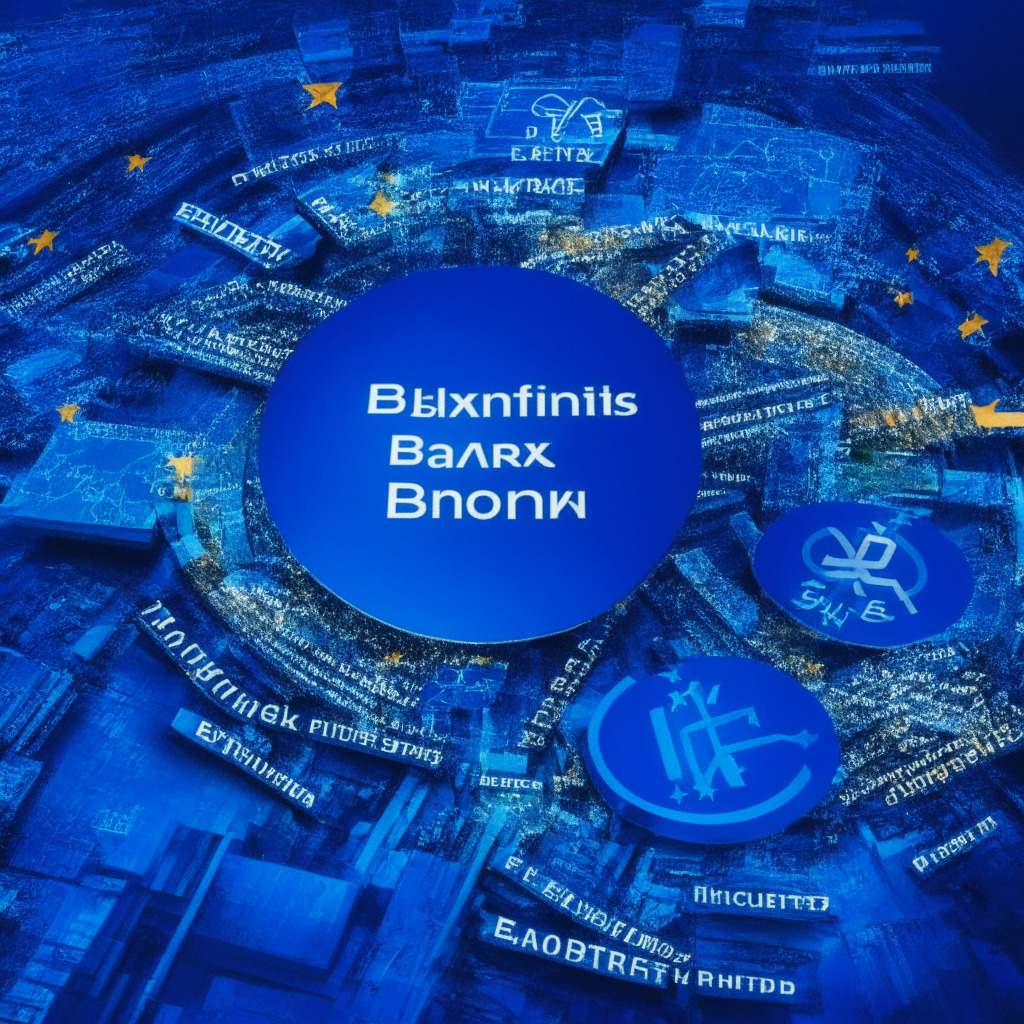In May, Binance Australia faced a sudden suspension from the country’s banking system, impacting around 1 million customers. The banking changes also affected the larger Australian crypto industry, emphasizing the urgent need for sensible regulation, licensing, and growth-friendly environments in the crypto space.
Search Results for: Customers Bank
FTX Bankruptcy: Media Outlets Vs. Privacy – Clashing in the Quest for Transparency
Four prominent media outlets appeal against a bankruptcy judge’s decision to permanently redact FTX crypto exchange customers’ names, citing the need for transparency. FTX argues that revealing names could expose clients to identity theft and scams, affecting the success of bankruptcy reorganization.
Debate Over FTX Customer Privacy: Balancing Crypto Risks and Bankruptcy Disclosures
This article discusses the debate surrounding FTX’s decision to protect customer names from bankruptcy disclosure requirements due to their use of cryptocurrency. The outcome may set significant precedents for future bankruptcy cases involving cryptocurrencies, focusing on balancing customer privacy and legal obligations.
Bankruptcy and Rebirth: FTX 2.0 Aims to Restore Value Amid Escalating Legal Costs
FTX’s bankruptcy filings reveal escalating legal and advisory costs totaling $121.8 million, prompting former clients to consider relaunching the exchange under new leadership. Spearheaded by crypto influencer Loomdart, the FTX 2.0 coalition aims to restore value to customers and expedite creditor repayment.
Deutsche Bank Goes Crypto: Exploring Their Move into Digital Asset Custody and Its Implications
Deutsche Bank, Germany’s largest banking institution, has applied for a digital asset custody license with BaFin, aiming to expand its digital asset custody services, including cryptocurrencies. This marks a shift from the bank’s previous critical stance toward the volatile and unpredictable crypto market.
Digital Yuan Expansion in Chinese Banking: Pros, Cons, and the Future of CBDCs
Chinese banks plan to expand the use of the digital yuan for purchasing wealth management products, allowing customers to connect their central bank digital currency (CBDC) holdings with securities accounts. This move strengthens the digital yuan’s practical applications in the financial industry and continues its ongoing rollout, but potential adverse effects on privacy, freedom, and the global economy remain to be seen.
Bankrupt BlockFi Fights Regulator in Desperate Attempt to Surrender License
Bankrupt crypto lender BlockFi files a lawsuit against Connecticut Banking Commissioner Jorge Perez for refusing to accept its surrender of its Connecticut money transmitter license. With $1 billion owed to creditors and thousands of retail investors waiting for fund withdrawals, BlockFi’s litigation seeks to pause court proceedings and prove violation of Section 525. This case highlights the challenges of navigating regulatory landscapes for cryptocurrency companies and the consequences for businesses and customers amidst emerging market oversight.
Bankrupt Voyager Set to Reopen: A Hopeful but Cautious Moment for Crypto Investors and Markets
Voyager’s platform is set to reopen between June 20 and July 5, allowing creditors to withdraw about 35% of their crypto following bankruptcy proceedings. This comes after the company’s core business lines were shuttered and customer transactions halted last year. The ongoing litigation involving Three Arrows Capital and FTX could potentially boost Voyager’s recoverable assets and impact the amount customers can reclaim.
Bankrupt Bittrex Allows Asset Withdrawals: Balancing Consumer Interests vs. Crypto Regulation
US Bankruptcy Judge Brendan L. Shannon recently granted Bittrex customers the opportunity to withdraw assets from the bankrupt exchange platform despite the DOJ’s objection. The court order highlights the complex balance between consumer protection and regulation in the cryptocurrency industry.
Banq Bankruptcy and BitGo Acquisition: Navigating a Shaky Crypto Custody Partnership
Banq, a subsidiary of Prime Trust, filed for bankruptcy protection following unauthorized transfer of $17.5 million in assets and trade secret leakage. This raises questions about the company’s acquisition deal with digital asset custodian BitGo and the future of the crypto custody market.
Battling Australian Bank Restrictions: Crypto’s Fight for Economic Freedom in the Land Down Under
Blockchain Australia plans to tackle crypto payment restrictions imposed by Australian banks, including the Commonwealth Bank, head-on by using real data. The industry body stresses individuals’ inherent right to decide financial matters and aims to implement consumer education programs on crypto benefits and identifying scams. The future of Australia’s blockchain industry significantly depends on banks adopting targeted methods while maintaining economic freedom.
Banks and Chainlink Team Up for Blockchain Interoperability: Possibilities and Security Risks
World’s largest banks, including Citi and BNP Paribas, are testing permissioned bank-owned blockchains under SWIFT’s guidance to enable communication with public blockchains like Ethereum. Chainlink’s technology will serve as the bridge, overcoming network fragmentation and ensuring secure information sharing across public and private chains.
Landmark Ruling Shields Crypto Customers’ Identities: Balancing Transparency and Privacy
In a landmark ruling, a Federal Court granted now-defunct FTX exchange permission to permanently shield customers’ identities during ongoing bankruptcy proceedings. This significant decision sets a precedent for customer protection in potential future bankruptcies, highlighting the challenges of maintaining a balance between transparency and privacy in the cryptocurrency sector.
FTX Bankruptcy and Customer Privacy: Protecting Assets or Hindering Trust in Crypto Markets?
The ongoing disagreement surrounding the collapsed crypto exchange FTX and the disclosure of customer names persists, with concerns that revealing names could “degrade value” and impair the sales process, affecting repayment to creditors. Highlighting the delicate balance between privacy and public transparency, this case could have ramifications on cryptocurrency regulations and future exchange operations.
Binance.US Banking Woes: Balancing Customer Protection with Crypto’s Legitimacy & Growth
Binance.US is suspending USD deposits and transitioning to a crypto-only exchange after the SEC lawsuit and banking partners severing ties. This decision aims to protect customers from potential regulatory action, but it raises concerns about the future growth and legitimacy of the cryptocurrency market.
Binance’s Ties to Signature and Silvergate Banks: Unraveling the SEC Lawsuit and Its Impact on Crypto
The SEC’s recent court documents reveal billions of dollars in Binance-related funds flowed through Signature Bank and Silvergate Bank, raising questions about Binance’s relationship with banks. The SEC found Binance, CEO Changpeng Zhao, and BAM Trading Services held accounts at both banks and alleges that millions of dollars from Binance-related accounts were commingled in Merit Peak’s accounts.
Balancing Crypto Safety and Growth: Commonwealth Bank’s Restrictions on Payments to Exchanges
Australia’s Commonwealth Bank announces partial restrictions on payments to cryptocurrency exchanges to protect customers from scams. The bank will decline certain payments or hold them for 24 hours and set a payment limit of 10,000 Australian dollars per month.
Commonwealth Bank’s Crypto Payment Limits: Balancing Safety vs Market Growth
Commonwealth Bank (CBA) plans to reject or temporarily withhold specific payments to crypto trading platforms, setting a monthly limit of A$10,000 for customer payments to protect from scams. As regulations in Australia are considered, banks and governments strive to balance growing crypto interest with customer protection.
Australian Banks Limit Crypto Transactions: Balancing Security vs. Innovation
Australia’s largest bank, Commonwealth Bank (CBA), is declining certain payments to cryptocurrency exchanges due to potential scam concerns, following recent lawsuits against Binance and Coinbase. To protect customers, the bank plans to limit crypto exchange transactions and impose 24-hour holds, raising questions about security and the need for regulatory balance in the market.
Commonwealth Bank’s Crypto Limits: Balancing Customer Protection or Infringing on Freedom?
Commonwealth Bank of Australia (CBA) imposes a $6,650 monthly limit on customers sending funds to crypto exchanges, aiming to protect users from scammers exploiting interest in cryptocurrencies. The decision raises debates within the crypto community, questioning whether such regulations safeguard customers or infringe upon individual freedoms. The ongoing dialogue about appropriate crypto regulation levels will shape the industry’s future.
Bankrupt FTX’s Anthropic Stake Sale: Navigating the Future of AI and Crypto Exchange Loss Recovery
The now-defunct cryptocurrency exchange FTX is looking to offload its stake in AI startup Anthropic, following bankruptcy. Anthropic, valued at $4.6 billion, is developing a general-purpose AI chatbot called Claude. The potential sale’s outcome may impact former FTX customers and stakeholders.
Revealed: Binance’s Influence Over Affiliate Binance.US Bank Accounts Raises Concerns
Bank records reveal Guangying Chen, a senior executive at Binance, as the primary operator for several Binance.US bank accounts, raising concerns about Binance’s influence over its supposed independent affiliate. This disclosure intensifies scrutiny as Binance faces legal action from U.S. regulatory agencies.
Genesis Bankruptcy Saga: Mediation Extension Frustrates Creditors & Gemini Users
The mediation period between crypto lender Genesis and its creditors, including Gemini, takes a new turn as U.S. Bankruptcy Court Judge Sean Lane extends it until June 16 amid growing concerns over parent company Digital Currency Group’s (DCG) role. This comes after the multi-billion dollar collapse of Genesis’ borrower – crypto exchange FTX – and tensions rise as the case resolution remains far from being concluded.
Genesis Bankruptcy Battle: FTX’s $3.9B Claim vs. Expedited Settlement – The High-Stakes Faceoff
FTX objects to extending court-mediated settlement talks for bankrupt crypto lender Genesis and opposes estimating their debtors’ claims at $0.00. As Genesis’ largest creditor with $3.9 billion claims, FTX’s objection adds to mounting pressure from individual creditors seeking faster resolution. Meanwhile, Genesis faces lawsuits and SEC actions over its customer lending program, Earn.
Apple Savings and Goldman Sachs Fiasco: A Closer Look at Inefficient Banking Practices
Users of Apple Savings service experienced severe delays in moving or withdrawing deposits due to “security reviews,” causing inconvenience and skepticism. This issue highlights the shift in traditional banking away from customer service, and questions banks’ ability to effectively serve customers while having power to freeze funds without appropriate explanations or transparency.
Japanese Banks Embrace Stablecoins: Will US Institutions be Left Behind?
Japan’s recent legal framework for stablecoins signals a move towards bridging traditional and decentralized finance, while the US faces regulatory hurdles and uncertainty. Japanese banks are now preparing to issue stablecoins as the country embraces distributed ledger technology for faster, cheaper payment systems.
Silvergate Collapse: A Wake-Up Call for Crypto-Friendly Banking? Lessons & Future Implications
The recent collapse of crypto-friendly bank Silvergate has raised regulatory concerns and may serve as a wake-up call for the crypto community. The event highlights the need for a cautious approach when investing in digital currencies and the importance of market stability.
Binance Considers Bank-Based Collateral: Security Boost or Increased Risk for Crypto Traders?
Binance reportedly plans to reduce counterparty risk, allowing some institutional clients to retain their trading collateral at a bank rather than on the crypto platform. This response to increased security demands follows FTX’s collapse last year. Swiss-based FlowBank and Liechtenstein-based Bank Frick are potential intermediaries for this service, with client funds secured through a tri-party agreement.
Binance’s Move to Bank Collateral: Reducing Risk or Impacting Market Dominance?
Binance is reportedly exploring options to allow select institutional clients to keep their trading collateral in banks, reducing counterparty risk amidst growing concerns over exchange failures. The exchange is in discussions with Swiss-based FlowBank and Liechtenstein-based Bank Frick as potential candidates for this service, as they continue to adapt to evolving regulatory requirements.
Binance Considers Bank-Based Collateral: Boosting Security or Fueling Regulatory Debate?
Binance is reportedly in talks to allow some institutional clients to keep their trading collateral at a bank instead of on the crypto trading platform. This move may enhance exchange stability and reduce risks for investors while providing additional security and flexibility. However, ongoing regulatory scrutiny and concerns about inherent conflicts of interest in crypto exchanges remain critical considerations.
The Future of Crypto Banking: Integration, not Acquisition of Traditional Banks
Binance CEO Changpeng Zhao addressed the idea of purchasing a bank to solve crypto’s disrupted banking relations, discussing regulatory complexity, capital requirements, and the challenges crypto industry faces when trying to work with traditional banking systems. Binance seeks a more sustainable solution for a harmonious integration between crypto and banking.
European Banks Eye Crypto Adoption: Bitpanda-Coinbase Alliance Pros and Cons
Austrian-based Bitpanda’s partnership with Coinbase enables the integration of Bitpanda Technology Solutions with banks and fintechs, offering crypto products to European customers. This collaboration may fulfill growing demand while raising questions about potential risks and the need for balancing viable digital asset services.































